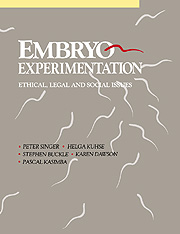Book contents
- Frontmatter
- Contents
- Foreword
- ACKNOWLEDGEMENTS
- INTRODUCTION
- PART 1 THE SCIENTIFIC ISSUES
- PART 2 THE ETHICAL ISSUES
- 4 Introduction: The nature of ethical argument
- ARGUMENTS ABOUT THE STATUS OF DIFFERENT DEVELOPMENTAL STAGES
- ARGUMENTS FROM POTENTIAL
- EMBRYO RESEARCH AND WOMEN
- PART 3 CONTROLLING EMBRYO EXPERIMENTATION IN A DEMOCRATIC SOCIETY
- FORMING A PUBLIC POLICY
- LEGISLATION AND ITS PROBLEMS
- APPENDICES
- GLOSSARY
- NOTES ON CONTRIBUTORS
- INDEX
4 - Introduction: The nature of ethical argument
Published online by Cambridge University Press: 05 June 2012
- Frontmatter
- Contents
- Foreword
- ACKNOWLEDGEMENTS
- INTRODUCTION
- PART 1 THE SCIENTIFIC ISSUES
- PART 2 THE ETHICAL ISSUES
- 4 Introduction: The nature of ethical argument
- ARGUMENTS ABOUT THE STATUS OF DIFFERENT DEVELOPMENTAL STAGES
- ARGUMENTS FROM POTENTIAL
- EMBRYO RESEARCH AND WOMEN
- PART 3 CONTROLLING EMBRYO EXPERIMENTATION IN A DEMOCRATIC SOCIETY
- FORMING A PUBLIC POLICY
- LEGISLATION AND ITS PROBLEMS
- APPENDICES
- GLOSSARY
- NOTES ON CONTRIBUTORS
- INDEX
Summary
In the field of embryo experimentation, scientific advance has been followed by ethical controversy from the very beginning. When Robert Edwards and Patrick Steptoe published, in Nature, the first account of the fertilization of a human egg outside the body, their experiments were immediately condemned by the Archbishop of Liverpool—and supported by Baroness Summerskill, the social reformer. The Times worried that the achievement brought us a step closer to selective breeding; another newspaper raised the spectre of cloning. The ethical debate has continued ever since. The essays which follow take it up once more, and seek to improve upon it.
No one denies that ethical issues are crucial in decision-making about embryo research. Government committees are set up to consider the ethical as well as the social and legal issues raised by the new developments in reproductive technology. The assumption is that only when the ethical issues have been discussed can some form of regulation either be recommended or be seen not to be required. Despite this acceptance of ‘ethics’, however, an understanding of the nature of ethics, and ethical argument, is often lacking. People still say that ethics is all a matter of subjective opinion. They seem to think that once this has been said, it is obvious that there is rather less scope for serious argument about ethical issues than there is about whether the economy is likely to improve, or even about whether cricket is a better game than baseball.
- Type
- Chapter
- Information
- Embryo Experimentation , pp. 37 - 42Publisher: Cambridge University PressPrint publication year: 1990
- 2
- Cited by

